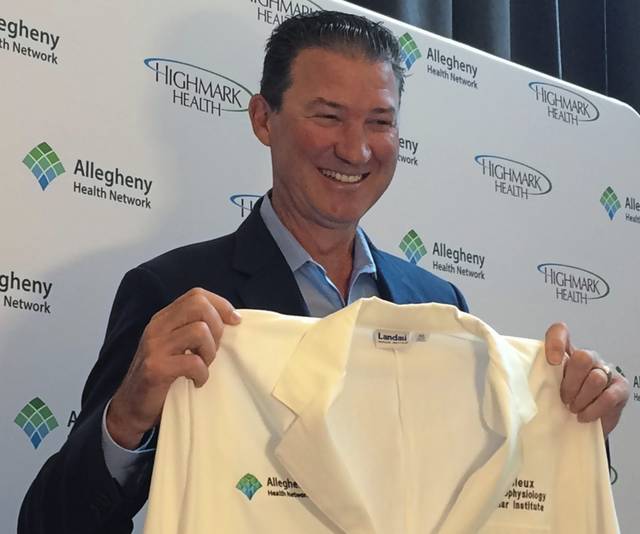The Mario Lemieux Foundation delivered a $1 million grant Monday to the Allegheny Health Network that will be used along with $1 million in matching funds from Highmark Health for research and therapies into heart rhythm disorders.
Dr. Amit Thosani, director of AHN’s Cardiac Electrophysiology Department, said the money would help with the development of next generation technologies to better diagnose and treat atrial fibrillation and other heart rhythm disorders.
The research will have a particular focus on finding minimally invasive therapies. Funds will also support the use of advanced data systems to develop more efficient and effective care for patients.
“With this very generous funding our program will be better positioned as an incubator for advanced cardiovascular research and innovation,” Thosani said. “We’ve made great progress over the past several decades in diagnosing and treating heart rhythm disorders, but there’s still so much to learn and improve upon. This new fund with the support of the Lemieux Foundation and Highmark Health will drive that exploration.”
Lemieux appeared at the announcement at Highmark Health headquarters in Downtown Pittsburgh with his wife, Nathalie. He didn’t speak during the announcement and declined to take questions afterward, but he was all smiles when AHN presented him with a personalized lab coat.
The Hall of Fame hockey player and owner of the Penguins was diagnosed in 2005 with atrial fibrillation.
“Years ago Mario was treated for AFib, and the best care was found at a facility out of state,” said Tom Grealish, president of the Lemieux Foundation. “Now, that’s changed, and quality cardiovascular care can be found right here in Pittsburgh, and the Lemieux Foundation is pleased to be a part of that.”
Atrial fibrillation is the most common heart rhythm disorder in the United States and affects more than 6 million people. It happens when the heart’s two upper chambers quiver out of sync with the lower chambers and causes less blood to circulate, increasing chances of heart failure and stroke.











